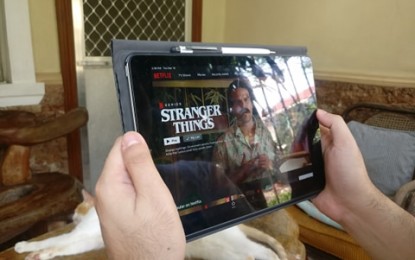
File photo
MANILA – The House of Representatives on Monday approved on third and final reading a measure seeking to impose a 12 percent value-added tax (VAT) on foreign digital service providers, such as Netflix and Spotify.
With 253 affirmative votes, four negative votes and one abstention, the chamber approved House Bill 4122, which seeks to clarify the imposition of VAT on electronic or online sales of services such as online advertisement services and provision digital advertising space, digital services in exchange for a subscription fee, and supply of other electronic and online services that can be delivered through the internet.
The bill requires nonresident digital service providers (DSP) to collect and remit the VAT on the transactions that pass through their platform.
It exempts educational services including online courses and webinars of private institutions from the 12 percent VAT.
The chamber also approved on final reading House Bill 4102, which seeks to impose an excise tax of PHP100 per kilo on single-use plastic bags, with 255 affirmative votes, three negative votes, and no abstention.
Sultan Kudarat Representative Horacio Suansing and Nueva Ecija Rep. Mikaela Angela Suansing, authors of the measure, said plastic pollution poses a major threat to the environment, particularly bodies of water such as rivers, where fishermen depend on for their livelihood.
The Suansings said aside from the adverse impact on the environment, plastics are a health hazard to human beings, as these products contain cancer-causing chemicals such as Bisphenol A or BPA.
They cited recent studies showing that BPA could “potentially be related to disruptions in gene expression, thereby affecting biological functions related to the body’s metabolism and development, as well as disruptions in fertility and sexual maturation.”
The bill defines “single-use plastic bags” as “secondary level plastics made of synthetic or semi-synthetic organic polymer such as “ice,” “labo,” or “sando” bags, with or without handle, used as packaging for goods or products.”
The tax would be increased by four percent every year starting on Jan. 1, 2026.
Meanwhile, House Bill 4339 or the proposed Package 4 of the Comprehensive Tax Reform Program hurdled final reading with 258 affirmative votes, three negative votes, and no abstention.
House Ways and Means committee chair Joey Salceda, principal author and sponsor of the three priority tax measures, said at least PHP47 billion in new revenues are expected to be generated annually.
Specifically, he said the VAT for nonresident DSPs is expected to yield some PHP19 billion, the single-use plastic bags tax would yield PHP9.3 billion, and PHP20 billion from Package 4, the bulk of which will come from removing the tax exemption in pickup trucks and increasing the tax rates on foreign currency deposit units to 20 percent.
He clarified that the VAT on digital services in the country will not be imposed on Filipino businesses.
"The emphasis is on foreign or nonresident digital service providers. All major Asean economies impose VAT on these entities. Tayo na lang ang hindi (We're the only ones who haven't done it),” Salceda said.
Meanwhile, he said the plastic bags tax is in line with the country’s efforts to fight ocean pollution, especially “as we are now recognized ignominiously as the world’s biggest ocean plastic polluter.”
For Package 4, he said the lifting of the exemption on pickup trucks merely corrects an "unfair privilege" on a vehicle that is mostly for the rich, occupies very large space on the road, and is "by all accounts less fuel-efficient" than most other vehicles. (PNA)
